Unit 4 Body language Reading
文档属性
| 名称 | Unit 4 Body language Reading | 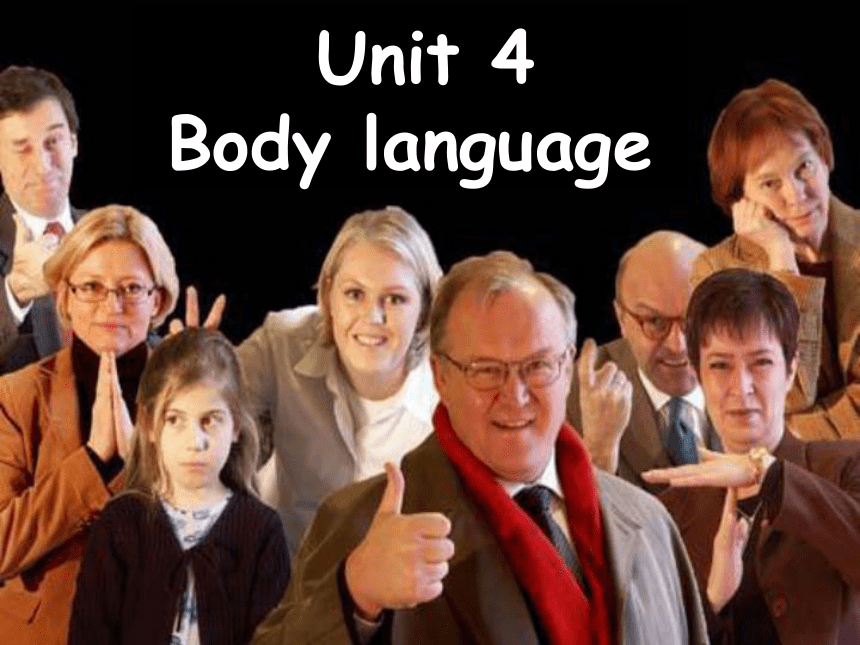 | |
| 格式 | rar | ||
| 文件大小 | 4.4MB | ||
| 资源类型 | 教案 | ||
| 版本资源 | 人教版(新课程标准) | ||
| 科目 | 英语 | ||
| 更新时间 | 2009-05-28 14:42:00 | ||
图片预览


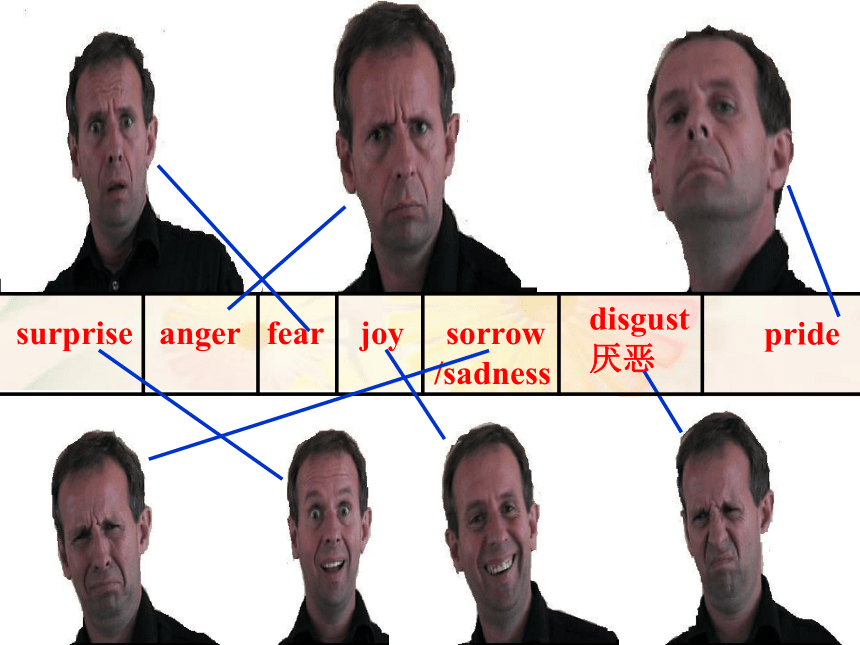
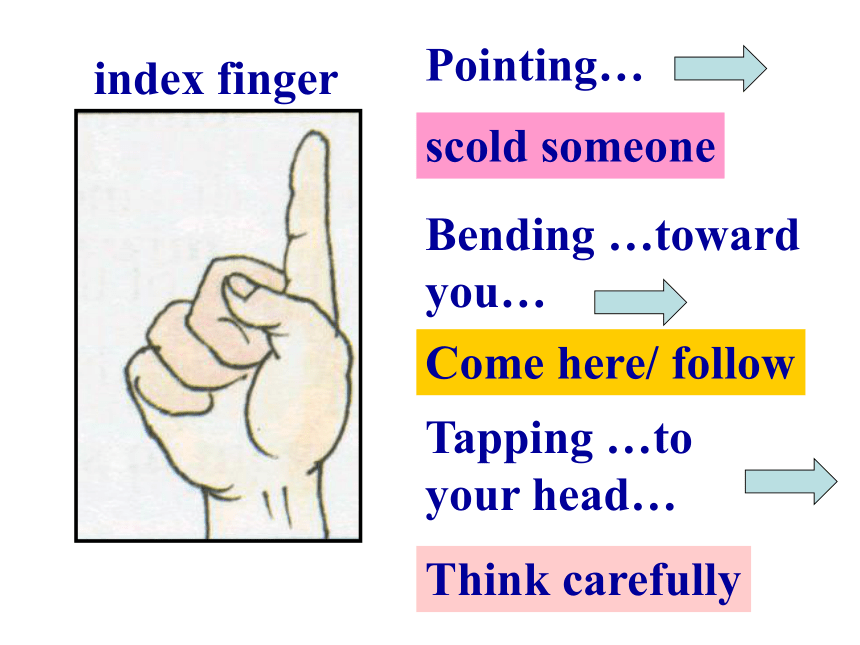
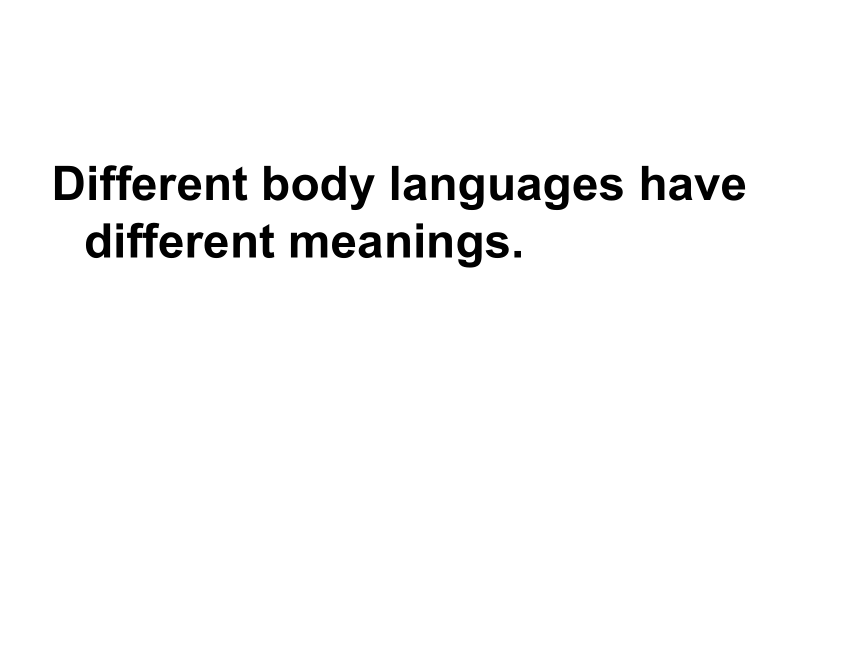
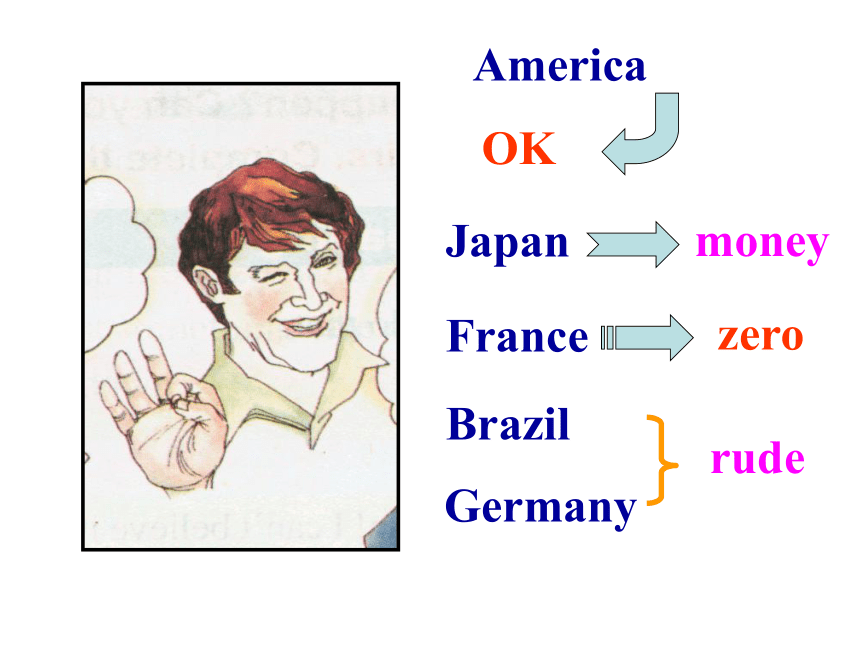
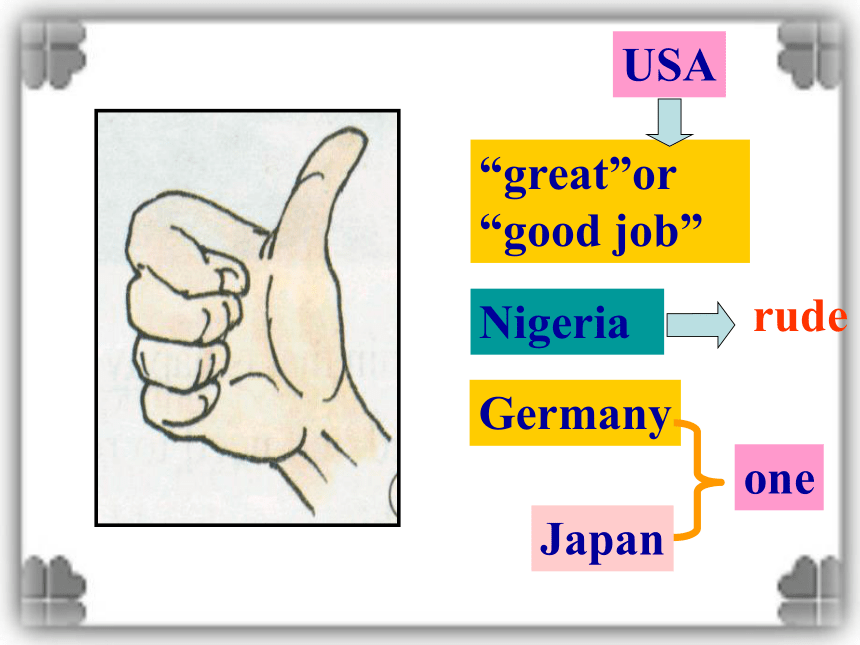
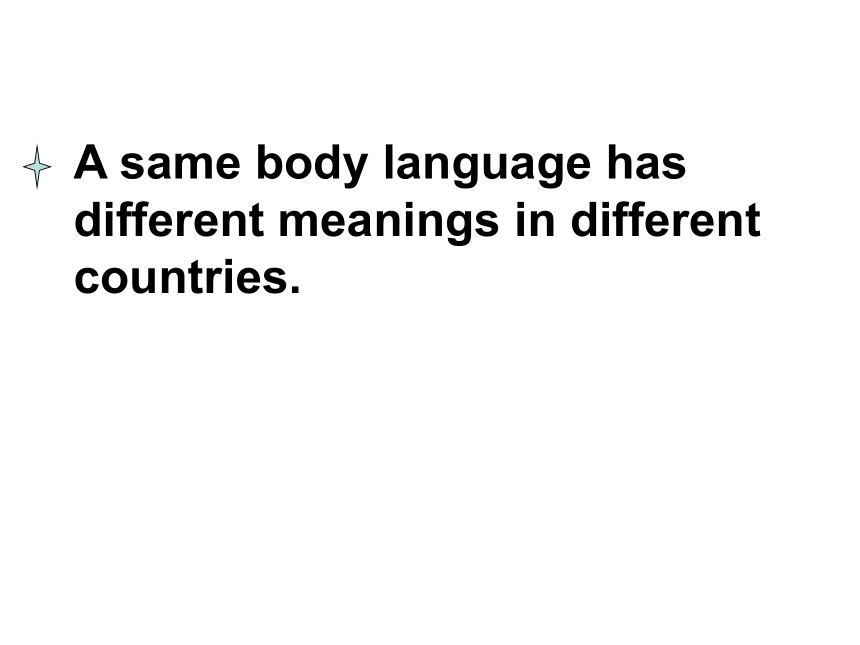
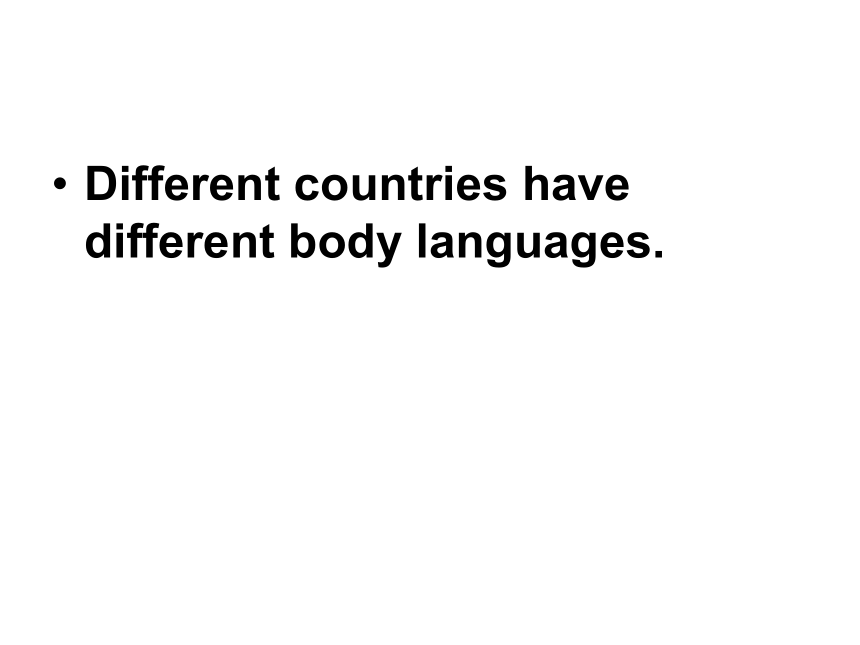
文档简介
课件26张PPT。 Unit 4
Body language What’s the purpose of language?
What do you think “body language” means?
Language is used to communicate or
tell people thoughts, feelings and
reactions.
Body language is the use of actions,
gestures, posture and facial expressions
to convey emotions.
anger fear joy sorrow
/sadnesspride surprisedisgust
厌恶index fingerPointing…Bending …toward
you…Tapping …to your head…scold someoneCome here/ followThink carefullyDifferent body languages have different meanings.
AmericaOKJapanmoneyFrancezeroBrazilGermanyrude“great”or “good job”USANigeriarudeGermanyJapanone
A same body language has different meanings in different countries.
Different countries have different body languages.
The passage can be divided into four parts, and match the main idea with each part. Step 1: Fast Reading
C) I went to the airport to meet this year’s international students.A) Summary of body language.B) More about cultural “body language” I know. D) Students from different countries express greetings in different ways
(Para1)(Para 2 and 3) (Para 4 )(Para 5 )Part 1 :Part 2:Part 3:Part 4:Part 1 Memory Checking
1. Who did I go to meet at the airport?
2. What were they coming to do?
3. Where would they be taken to?How many characters are mentioned in the airport?
Who are they and where are they from?
Para 2/3 Tony Garcia (Columbia)Julia Smith (Britain)
George Cook (Canada) Akira Nagata
(Japan)Ahmed Aziz
(Jordan)
Darlene Coulon
(France)
SkimmingFind out the two mistakes the writer found in the airport:Tony Garcia Julia SmithThe first mistake from _________from _______ColumbiaBritainHe approached Julia, ______ ____ _______ and ______ her on the _____.She ______ ________ appearing _________ and ___ __ ____ ____ as if ___ _______.kissed cheekstepped backsurprisedput up her handsin defencetouched her shoulderPara. 2The second mistakeAkira Nagata from ______George Cook from _______CanadaHe ________ his hand _____ to the Japanese.He ______ to George but his nose _______ George’s __________ hand .bowedtouchedmovingreachedoutJapanPara. 2DetailsPara. 3-4People & countriesMove very close to, shake hands, nod at women.Shake hands, kiss twice…Stand close, not shake hands with womennot stand close or touch, shake hands.
bow
approach others closely
The Maori in New Zealand touch noses to greet people.
In Vietnamese culture, only parents or a high-ranking person can touch your head.
A Bulgarian nods to mean “no” and shakes his head from side to side to mean “yes”.
……Do you know more examples about
body Language in different countries?
Is the author of this passage male or female?
How do you know ?
Male.
Ahmed Aziz will usually not touch women, but he shakes hands with the author and stand quite close to the author to talk.
Para. 3What is the author’s conclusion?When you are in foreign countries
what should you do ?why?DISCUSSION:When in Rome, do as the Romans do!
when we are in a certain place, we should follow the customs of the people who live in that place, not our own customs. Because body language varies from culture to culture. Not all members of all cultures behave the same way. We should try to master and respect each other’s culture in order to make good communication.
Para. 4Not all cultures greet each other the same way,
nor are they comfortable in the same way with
touching or distance between people.
and also not ,neither6.not 与all, both, every, each 及含every 的合成词连用时,无论not位于这些词的前面还是后面,都构成部分否定,意为“并非所有的… …都… …”
表示全部否定,要用none, neither, no one, nothing或no等来表示或借用never, not…at all来进行全部否定。
I agree with most of what you said, but I don’t agree with everything.2) not …nor…既不… …也不… …
They do not shake hands with women, nor are they likely to kiss women publicly.
他们既不与妇女握手,也不在公共场合亲吻他们。
3)nor 放在句首,该句子应用部分倒装语序,即把be动词、助动词或情态动词放在主语前面。
Not a single word did he say at the meeting last night.
昨天在会上他一句话也没说。
Never has he been to China.
他从来没有来过中国。注:① 含有否定意义的副词置于句首。如:not, never, seldom, hardly, rarely, little等。
② 含有否定意义的连词置于句首。如:not only…but also, neither…nor…, no sooner…than…, hardly…when, scarcely…when…等。
③含有否定意义的介词短语置于句首。如:by no means, in no time, in no case, on no account, under no circumstances等。
④ neither, nor(表示否定);so(表示肯定)置于句首,表示后面所说的情况与前面所说的情况相同。
Body language What’s the purpose of language?
What do you think “body language” means?
Language is used to communicate or
tell people thoughts, feelings and
reactions.
Body language is the use of actions,
gestures, posture and facial expressions
to convey emotions.
anger fear joy sorrow
/sadnesspride surprisedisgust
厌恶index fingerPointing…Bending …toward
you…Tapping …to your head…scold someoneCome here/ followThink carefullyDifferent body languages have different meanings.
AmericaOKJapanmoneyFrancezeroBrazilGermanyrude“great”or “good job”USANigeriarudeGermanyJapanone
A same body language has different meanings in different countries.
Different countries have different body languages.
The passage can be divided into four parts, and match the main idea with each part. Step 1: Fast Reading
C) I went to the airport to meet this year’s international students.A) Summary of body language.B) More about cultural “body language” I know. D) Students from different countries express greetings in different ways
(Para1)(Para 2 and 3) (Para 4 )(Para 5 )Part 1 :Part 2:Part 3:Part 4:Part 1 Memory Checking
1. Who did I go to meet at the airport?
2. What were they coming to do?
3. Where would they be taken to?How many characters are mentioned in the airport?
Who are they and where are they from?
Para 2/3 Tony Garcia (Columbia)Julia Smith (Britain)
George Cook (Canada) Akira Nagata
(Japan)Ahmed Aziz
(Jordan)
Darlene Coulon
(France)
SkimmingFind out the two mistakes the writer found in the airport:Tony Garcia Julia SmithThe first mistake from _________from _______ColumbiaBritainHe approached Julia, ______ ____ _______ and ______ her on the _____.She ______ ________ appearing _________ and ___ __ ____ ____ as if ___ _______.kissed cheekstepped backsurprisedput up her handsin defencetouched her shoulderPara. 2The second mistakeAkira Nagata from ______George Cook from _______CanadaHe ________ his hand _____ to the Japanese.He ______ to George but his nose _______ George’s __________ hand .bowedtouchedmovingreachedoutJapanPara. 2DetailsPara. 3-4People & countriesMove very close to, shake hands, nod at women.Shake hands, kiss twice…Stand close, not shake hands with womennot stand close or touch, shake hands.
bow
approach others closely
The Maori in New Zealand touch noses to greet people.
In Vietnamese culture, only parents or a high-ranking person can touch your head.
A Bulgarian nods to mean “no” and shakes his head from side to side to mean “yes”.
……Do you know more examples about
body Language in different countries?
Is the author of this passage male or female?
How do you know ?
Male.
Ahmed Aziz will usually not touch women, but he shakes hands with the author and stand quite close to the author to talk.
Para. 3What is the author’s conclusion?When you are in foreign countries
what should you do ?why?DISCUSSION:When in Rome, do as the Romans do!
when we are in a certain place, we should follow the customs of the people who live in that place, not our own customs. Because body language varies from culture to culture. Not all members of all cultures behave the same way. We should try to master and respect each other’s culture in order to make good communication.
Para. 4Not all cultures greet each other the same way,
nor are they comfortable in the same way with
touching or distance between people.
and also not ,neither6.not 与all, both, every, each 及含every 的合成词连用时,无论not位于这些词的前面还是后面,都构成部分否定,意为“并非所有的… …都… …”
表示全部否定,要用none, neither, no one, nothing或no等来表示或借用never, not…at all来进行全部否定。
I agree with most of what you said, but I don’t agree with everything.2) not …nor…既不… …也不… …
They do not shake hands with women, nor are they likely to kiss women publicly.
他们既不与妇女握手,也不在公共场合亲吻他们。
3)nor 放在句首,该句子应用部分倒装语序,即把be动词、助动词或情态动词放在主语前面。
Not a single word did he say at the meeting last night.
昨天在会上他一句话也没说。
Never has he been to China.
他从来没有来过中国。注:① 含有否定意义的副词置于句首。如:not, never, seldom, hardly, rarely, little等。
② 含有否定意义的连词置于句首。如:not only…but also, neither…nor…, no sooner…than…, hardly…when, scarcely…when…等。
③含有否定意义的介词短语置于句首。如:by no means, in no time, in no case, on no account, under no circumstances等。
④ neither, nor(表示否定);so(表示肯定)置于句首,表示后面所说的情况与前面所说的情况相同。
同课章节目录
